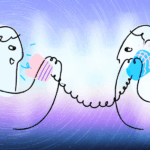By Rupert A. Hayles Jr.
It was a brisk fall day. The organization for which I was a senior executive was about to embark on one of their most ambitious goals ever. We were putting on the greatest event our organization’s parent company had held in its 20-year history — exciting to say the least. I was emotionally charged up driving to the palatial Crystal Plaza in preparation to meet all the dignitaries, families, and friends of the organization. As the leader of the group, I realized there were many activities that needed to be done prior to officially starting the event.
I relied heavily on my assistant, Cheryl, who was the person who would make sure all the plans were executed. Ten minutes prior to my arrival, I called her on the phone. I requested all the information we had agreed upon to be ready for me at the front desk. I said to her, “Cheryl, please have the documents for me when I pull my car up to the front door.”
I could tell she was nervous and concerned. She said to me, “I’m sorry. I don’t have the documents. I’ve been working on the registration all day, and, even though we are a half hour away from the official start of the event, we are not fully prepared.”
I felt the blood in my veins begin to percolate as she spoke of the impending nightmare and ultimate disaster. I felt as though I was having an out-of-body experience. I seemed to be leaving my natural body, looking down at myself as I screamed at her, “I’ve told you numerous times to be prepared. I will not have any of this nonsense. Your behavior reflects badly on me, on our leadership, and our organization. You have disgraced me.”
She started to cry. I said, “Why are you crying? Was it something I said? How dare you do this now when we’re at this most critical moment?”
The only thing I believed I could do was to hang up and start trying to devise strategies for the containment of what was about to happen.
This was also the beginning of my journey into understanding the emotional component of my life — the before I do what I do, how I do it, the manner in which I execute things, and how my actions might impact others.
The beginning of the event was a disaster. Nothing worked as planned. I was furious. Our guests had arrived, and there was no registration information for them to get into the event. There were no nameplates or table settings, and the list of attendees was in table order instead of alphabetical order. Those around me tried to calm me down and tell me everything would be OK. I, however, was inconsolable. All I knew was this event had taken us over one year to plan and was getting off to the most dreadful start, with the expectation that it would be going downhill shortly. Dignitaries arrived and were shuffled to on-the-spot table assignments. An adversary in the media was assigned to the table with one of my most cherished donors.
Throughout the evening, I reflected on what could have been done to ensure this disaster could have been prevented. Deep within myself, I knew that Cheryl had done the best job she possibly could, but I also remembered that a few days before, I had reminded Cheryl about what we needed to do to ensure a successful event. I had even offered her additional assistance. She, at that time, refused and said, “Rupert, I am OK. All is well.” I felt if only she had listened to my instructions, things would have ended in a better place.
Weeks later, I was informed that Cheryl had a major breakdown the night before the event. She also had a panic attack shortly after I had hung up the phone with her before the event started. She initially refused to come to the event because she knew it was going to be one big disaster, but she made an appearance at the insistence of one of her closest friends.
My roles as chief operating officer of a megachurch and as president of the affiliate organization kept me quite busy. I quickly internalized what had occurred at the event and concluded it was all Cheryl’s fault.
_
“There is one thing about Jesus I can say, and it is this: No matter who He was speaking to, that person never felt less than who they were.” – Dr. David Ireland
_
Realizing the Need to Change
I hastily moved on to my next priority, a short-term mission trip to the Dominican Republic just a few weeks later. I was traveling with the senior pastor of our church, Dr. David Ireland. As we departed for the Dominican Republic, I sensed Dr. David had something he wanted to discuss with me.
The trip was to hold leadership-training sessions, and many days and hours were spent speaking to large crowds of people about leadership development. It wasn’t until the final day, in the final hour, that I received a call from Dr. David. He requested I come to his room because he had something important to talk to me about.
When I got to his room, he asked me to sit on the couch. He said, “Rupert, it is important when you are dealing with people that you ensure they feel respected. It is important they feel cared for and that they feel loved. It has come to my attention that Cheryl feels she has been insulted, ridiculed, and made to feel like less of a person than she really is. Cheryl’s friend and co-worker, Carmella, called my office crying and told me Cheryl did not feel like working at the church or the affiliate anymore. Carmella stated that you insulted Cheryl so badly it had left her feeling inferior.”
Dr. David added, “You know, Rupert, there is one thing about Jesus I can say, and it is this: No matter who He was speaking to, that person never felt less than who they were. It didn’t matter if Jesus was speaking to a Pharisee, to a beggar, or to a king — that person never felt belittled. You need to apologize to her.”
_
“Deep within me, I could feel my emotions scatter.”
_
I became defensive and said that the failure of the event was all Cheryl’s fault. As we continued our dialogue, however, it became clear to me that I had contributed significantly to what had occurred. Tears welled up in my eyes as the pain, pressure, and emptiness of my soul came to light. I realized I needed to change. I realized it didn’t matter what others do. What does matter, however, is how I react, and what I do about it. I felt confused, conflicted and frustrated because I knew I was trying to do the best I could with what I had.
Dr. David began to pray for me. I recognized in that moment I would never be the same again. Deep within me, I could feel my emotions scatter. A host of feelings arose in me. I felt anger, pain, shame, guilt, stress, anxiety, and unhappiness — all at the same time. I felt something existed within me that needed to be cleansed and rooted out. I could not articulate it, but I knew I had to change.
On the return flight, I was reading one of my pastor’s books, “Journey to the Mountain of God.” A wonderful flight attendant noticed I was reading the book and asked me if I knew Dr. David Ireland. She was thrilled when I introduced her to Dr. David. She told me she was currently reading a book titled “Abba’s Child” by Brennan Manning.
_
“At times, our impostor protects us. At times, however, our impostor masks who we really are.”
_
She showed me the book, and as I began to read it, I found the words in the book expressed what I was feeling. The sovereignty of God was amazing to me in that He would allow me to be on an airplane and have someone give me the very book that expressed what I was feeling. The book spoke about having an impostor in your life, someone or something that takes the place of you in certain circumstances. When we get angry, our impostor comes out. When we get afraid, our impostor comes out. At times, our impostor protects us. At times, however, our impostor masks who we really are. After that flight, I delved deeply into the book, and it helped me to understand and learn why I was the way I was and what I needed to do in order to be a true servant of God.
Over the next few weeks, I thought about who I really was. One specific item the Holy Spirit kept directing me to address was the issue of anger in my life. At times I would have serious outbursts that were sometimes uncontrollable, yet here I was — a child of God. How could I be angry and simultaneously be a child of God? How could I have rage and be a child of the King? These things did not make any sense to me. One thing I did know was I needed to apologize to those I had hurt in the past and to make a significant change from deep within. The time for dealing with this impostor was at hand.
Every Tuesday morning, the entire staff would gather for chapel, a time of praise, worship and Bible study. I requested five minutes after Bible study so I could address the staff. I stood up in front of the entire staff and began to tell them how I felt. [The message to the staff is included in the book “Emotional Intelligence and the Church.”]
I embarked on a wonderful journey of restoration and the discovery of who I really am. I began to investigate why I behaved in a certain way. I began to ask myself the question, “If I am a child of God, how can I show and control my emotions rather than having my emotions control me?”
Reflection and Prayer
Think back on the things you have done — things that bother you, things you hope you hadn’t done or times you wished you hadn’t displayed a particular kind of behavior.
Ask God to show you why this occurs.
Close your eyes and meditate for a minute; then open your eyes.
Pray the following: “Dear Lord, you created me. You know everything about me. Lord, I know that others might not appreciate me or my behavior, but one thing I do know, Lord, is that you love me. Please show me now the things that could be detrimental to me in my development as a person and as a son or daughter of yours. Reveal it to me now, Lord. Amen”
Write down what God has revealed to you.
+

Rupert A. Hayles Jr., Ph.D., is the president of Roberts Wesleyan University and Northeastern Seminary. He previously served at Pillar College. Prior to his career in higher education, Hayles served in the U.S. Air Force as an officer before transitioning to the private sector to support organizations with strategic management, organizational development and advancement, and executive coaching for more than 25 years. He is the author of several books including “Emotional Intelligence and the Church” from which this article is adapted with his permission.










